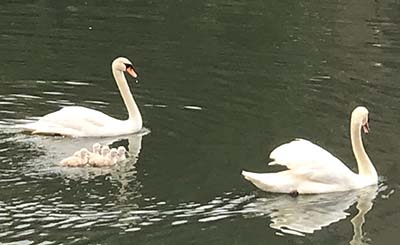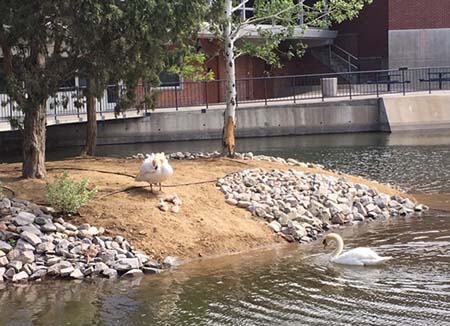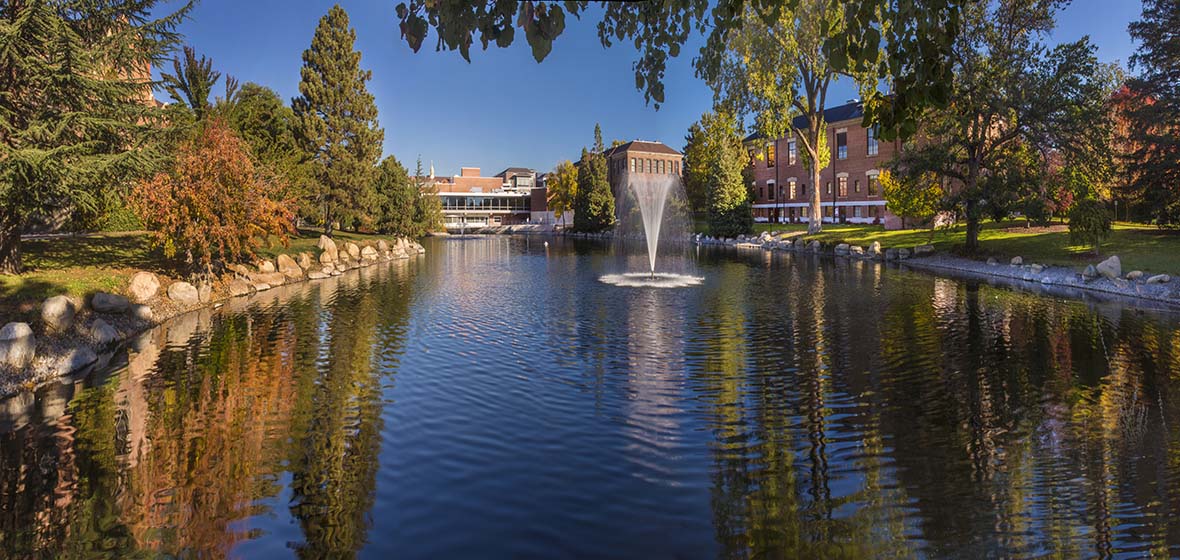It's been an eventful spring at the University of Nevada, Reno campus for resident swans Zeus and Athena. In March, the University launched a crowdfunding campaign to raise funds to improve Swan Island on Manzanita Lake and to make it a more permanent and natural habitat.

Zeus and Athena have welcomed five baby swans (cygnets) to their family on Manzanita Lake.
Unlike geese or ducks, swans are not local to Nevada, therefore they require extra care all year long. Led by Assistant Director for Ground Services Marty Sillito, University Facilities Services has watched over the swans throughout the years by making nests for them to live in and lay eggs, as well as providing extra food during the winter months.
Throughout the spring, Facilities Services worked on updating the island to provide a more secluded space when eggs are being incubated and is happy to announce the addition of new inhabitants swimming around - Zeus and Athena have welcomed five baby swans (cygnets) to their family. Manzanita Lake was created in 1911. The lake has become one of the most recognizable spots on campus, due largely to the swans who have called Manzanita Lake home for nearly 90 years. There are generally two swans at the lake, and past swans have included black Australian swans Boris and Natasha, and white mute swans Olivia, Zubb, Zeus and Athena.
The community support during the fundraising campaign was overwhelming, and the University was able to meet its original goal of $15,000 and surpass it by 26 percent to reach $18,965, supported by a total of 211 donors. Additional gifts will be used to purchase pollinator-friendly vegetation.
The update to the island included improvements such as:
- removing concrete tubes that bordered the island with larger rocks;
- creating paths that now allow the swans and their offspring to access the lake and their shelter safely;
- planting new vegetation around the island to provide as natural a habitat as possible;
- and extending vegetation was added onto the shore, creating a garden and swan viewing area.
Pollinator and aquatic plants will be added to the island and viewing area throughout the spring and summer. Volunteers from Fish and Wildlife, the University Pollinator Group and University Arboretum Committee will also begin work after commencement to plant a garden. Final rock pathways and rock mulch will be added after.

The cygnets' wings have been clipped or "pinioned," enabling them to stay at Manzanita Lake until they are older and stronger. Facilities Services will later find new homes or sanctuaries better suited for them to claim their own territory.
A new Manzanita Lake camera was launched this spring, also, where viewers can now catch a glimpse of the cygnets or the many baby ducks and geese that now call Manzanita Lake home.
Questions about this project can be directed to Torrey Hood at torreyhood@unr.edu or 775-682-6544.












